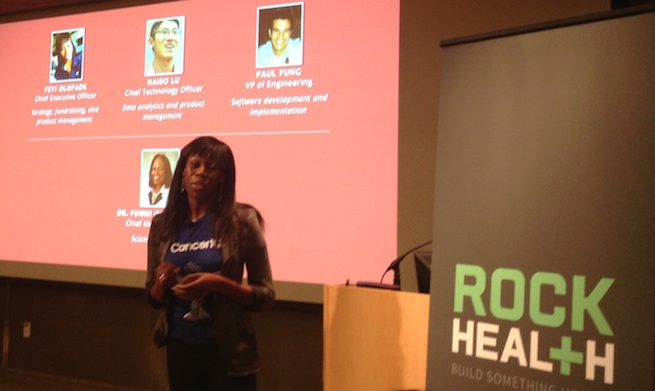SAN FRANCISCO — At Rock Health, entrepreneurs are developing innovative products to keep us healthier, and lower medical care costs.
Ten health startups in Rock Health’s current accelerator class presented to a roomful of investors and the press today. Rock Health is a startup accelerator that focuses on health care technology.
The current class of startups are tackling huge challenges in health care, such as cancer treatment or eating disorders.
Interest in digital health — and Rock Health startups — is surging, as evidenced by the number of venture capitalists in the room. At demo day, I spotted investors from venture firms like Aberdare, Morgenthaler (now Canvas), Emergence Capital and General Catalyst.
As you might expect, the wearable technology startups garnered plenty of interest — a respiration tracker called Spire has been trending on AngelList all week. We frequently heard terms like “big data” and “data science” during the presentations — most of the founders had a strong engineering background. For instance, one Rock Health startup, Anapsis, was founded by a distributed systems engineer at Microsoft.
The ban on general solicitation was lifted this week, meaning that startups can publicly announce that they are fundraising. Investors can fund Rock Health’s startups on AngelList. According to Rock Health, the current class pulled in $5.5 million in funding before Demo Day. Many of the startups announced that they have already closed a seed round of funding. Others are still looking to fill out their round.
Here’s the full list of startups that launched today.
Amplify Health makes tools to manage patients and reduce avoidable health care costs.
What’s unique about it? The software enables primary care physicians (PCPs) to direct contract with self insured employers and proactively manage their patients. The company says it has 27,0000 physician users.
Anapsis is a research platform and marketplace for scientific and statistical computing.
What’s unique about it? The company was founded by a distributed systems engineer at Microsoft. The founders are also the youngest in the current batch.
Augmedix is a service for doctors for Google Glass.
What’s unique about it? Cofounder and chief executive Ian Shakil was one of the first people to test out Google Glass, and said he was “blown away” by the opportunities for physicians. I agree — physicians told me that Google Glass may prove to be a valuable hands-free device for surgery. The wearable device may be used in future for a variety of use-cases — check out our full list here.
CancerIQ is using analytics technology to offer personalized cancer care.
What’s unique about it? The company’s chief medical officer, Dr. Olufunmilayo Olopade, is the founding director of the Cancer Risk Clinic at the University of Chicago. Olopade has opened doors for the company and helped it connect with hospitals and other care providers. In addition, the company has raised $2.5 million in grant money and is looking for institutional financing for the first time.
CRIXlabs builds software for for removing risk from drug development. The technology is designed to accelerate development of nanotechnology-based therapies. The goal is to help pharmaceutical makers run experiments at a fraction of the cost.
What’s unique about it? The company cofounder and chief technical officer Shalini Ananda is a renowned expert on machine learning and nanotechnology. It’s all too rare that we hear a presentation from a women CTO.
Lift Labs makes active stabilization tools for people living with tremors.
What’s unique about it? The first product is a “smart spoon” — it makes it easier for people with tremors to eat a full meal. Rather than trying to stop the hand from shaking, the technology keeps the spoon steady using “active cancellation technology.”
Sensentia automates complex health care administration tasks that until now required human intervention, driving higher efficiency and better quality at lower costs.
What’s unique about it? The company uses artificial intelligence to replace call centers for insurance companies, making it faster and more accurate than a human call center. The goal is to lower costs for insurance providers and speed up the process for physicians.
Smart Patients is an online community for cancer patients and their caregivers.
What’s unique about it? The company was founded by former Google Health chief Dr. Roni Zeiger.
Spire is a next-generation wearable for productivity and wellbeing. More specifically, it tracks respiration, which has implications for stress. The company claims it has been trending on AngelList. “Wearables are growing in a very large way,” said chief executive Jonathan Palley.
What’s unique about it? The company is a favorite — it has already raised $1.4 million from investors like Facebook Gift’s creator Lee Linden. The company recently completed a pilot with LinkedIn employees and claimed to increase productivity for about 75 percent of employees.
ThriveOn delivers mental health on demand. The first product, Healthy Body Image, is designed to prevent young people from developing eating disorders. The first market is college students.
What’s unique about it? We haven’t seen many startups develop technology tools for mental health. It’s a huge and underserved need. The company has 40 universities signed up. The founders met at Trulia — they were both early employees.


